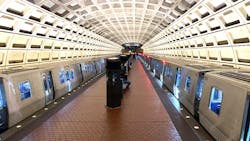WMATA to focus on root cause analysis before returning 7000-series cars to service
It will be around 90 days before Washington Metropolitan Area Transit Authority (WMATA) will resume the return of its 7000-series railcars to service. WMATA General Manager and CEO Paul J. Wiedefeld says the authority’s focus should be on determining the root cause of an Oct. 12, 2021, derailment and acquiring needed technology to measure the wheelsets.
“Dedicated staff members are working with three outside groups to make sure the new railcars are safe to operate, and we concluded that their efforts to maintain and inspect trains – with maximum capacity getting just five trains back in service each day – isn’t where we need to be focused,” Wiedefeld said. “We are going to redirect our efforts towards identifying and tackling the root cause of the derailment and take steps to better support more continuous wheel measurements by installing trackbed technology.”
WMATA will continue to operate its rail service, which it says carries average wait times of less than 10 minutes on all lines. The authority will continue its accelerated efforts to restore 6000-series cars during the 90-day period that will increase the availability of new cars and improve reliability. Pre-pandemic, WMATA carried around 120 passengers per car. However, the rail system is currently averaging 45 passengers per car, which it says is caused by increased telework following the surge in COVID-19 cases due to the Omicron variant and the holidays.
The 7000-series railcars were originally pulled from service following an Oct. 12, 2021, derailment where a wheelset was found to be out of compliance with specifications.
WMATA continues to work with the National Transportation Safety Board as it continues its investigation into the probable cause of the derailment. The authority is also working with the Washington Metrorail Safety Commission, which will approve WMATA’s plan to bring the railcars back into service, as well as Transportation Technology Center, Inc., in Pueblo, Colo., which is aiding WMATA in its root cause analysis.
About the Author

Mischa Wanek-Libman
Group Editorial Director
Mischa Wanek-Libman is director of communications with Transdev North America. She has more than 20 years of experience working in the transportation industry covering construction projects, engineering challenges, transit and rail operations and best practices.
Wanek-Libman has held top editorial positions at freight rail and public transportation business-to-business publications including as editor-in-chief and editorial director of Mass Transit from 2018-2024. She has been recognized for editorial excellence through her individual work, as well as for collaborative content.
She is an active member of the American Public Transportation Association's Marketing and Communications Committee and served 14 years as a Board Observer on the National Railroad Construction and Maintenance Association (NRC) Board of Directors.
She is a graduate of Drake University in Des Moines, Iowa, where she earned a Bachelor of Arts degree in Journalism and Mass Communication.
